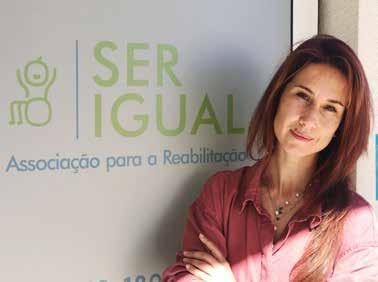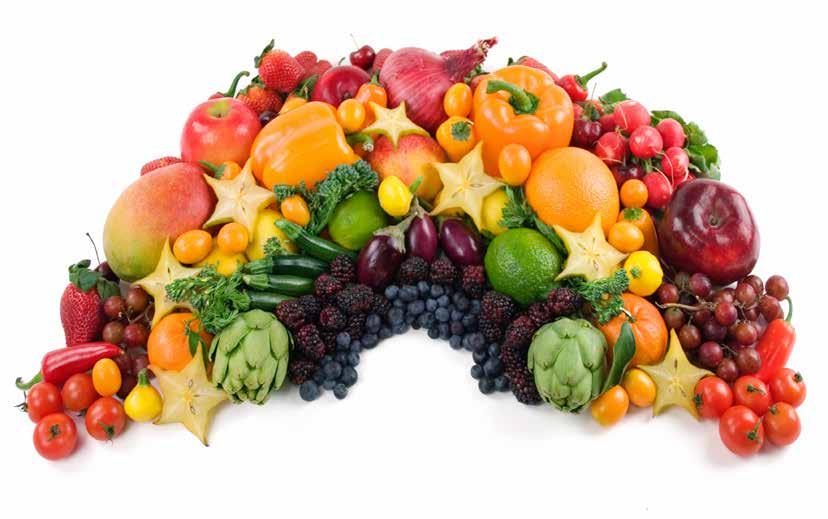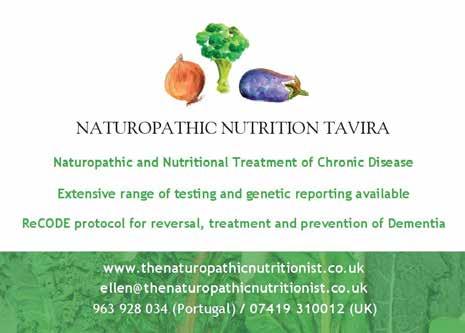
13 minute read
BAD ADVICE
BAD ADVICE... Ask the Expat
Not all advice is good and not all people are as genuine as you may think. Enjoy our 'bad advice' column from the expert we've all met, know and love... the Expat.
Advertisement
Today in Our Bad Advice, we
are joined by a panel of two prominent local individuals determined to provide you, our local East Algarve Expats, with a helping hand of inconsistent but broad bottomed and heartfelt advice.
Today we are joined by Sabrina and Evi of the Elite Algarve Landlord Alliance who are seeking to empower the interests of landlords in the Algarve. “I am writing to you because I need urgent advice about my tenants. I am appalled that they have given us three months' notice because they learnt we were overcharging them and they dared to criticise us for being unresponsive as landlords. They complained of winter mould and dampness. We told them, if they didn’t breathe, there would not be any, they can hold their breath! Regarding a leaky lavatory, we also told them we have no duty to repair it and that this expectation is to be met by tenants, especially overweight ones who crack the plumbing with their abhorrent waste. With five months left, we have demanded they pay the entire year and shockingly these lots refused. We are sitting in one of our other houses in Bordeaux and are disgusted at their intention to quit. They shouldn’t be allowed to as we are off to an Antiques Auction today, which this Algarvian house was due to fund as a spoke in our multinational empire. We have threatened them with international solicitors, who we haven’t actually spoken to yet, but they have thrown back the law of Portugal at us! We are horrified that as tax exiles and property owners, we are expected to fulfil any duties to gain profits. We are refusing to return any deposits, so they are refusing to pay any rent. We also gave a detailed inventory of each item in the flat, and warned that there will be a minimum of 100 Euro fines for any broken items, be it glass, unmatching crockery, or scuff marks. We have demanded more money, but they are refusing to give us any - like the thieving vermin they are. Other than writing pitiful messages on Expat Facebook pages about our plight, how can we deal with these appalling "rogue tenants”?
Sabrina: Quite right, there is nothing more appalling than the interference of the state in property owners business, which is why at the Elite Algarve Landlord’s Association we offer illicit advice and tactics of manipulation, deception, and intimidation, though without any legal duress and disclaimers of legal non-accuracy. There is nothing worse than an ungrateful tenant who seeks out information about how to support themselves. As Elite people, we have regular quarterly meetings at the Opulence Golf Club and Resort to extend our networks and protection rackets. We have great associations, with roughies for hire, who are indispensable at collecting debts that are not owed or hiring individuals posing as Portuguese law enforcement. Of course, this is all off the record, but if you join our association, people will know you mean business!
Evi: It also seems you were somewhat naive in your approach. Might I suggest creating false picture property adverts and demanding a full year's rent upfront, if you remain outside of the country? Portuguese and European rights are very pedantic, but let’s face it, there are always loopholes to find and ways to maximise your profits with minimal efforts on your part.
Sabrina: Yes Evi, it seems inventories are a useful way of extorting more money. If you discover the tenant hasn’t taken a dated video of the house, always claim more damage. If you offer basic amenities such as Ikea plates, always claim that they were Furstenberg. If they demand repairs, claim it was they who caused the damage.
Evi: We would love to meet you as a fellow Elite. Breathe in, as we know the difficulties of letting property to inconveniences who should not have been born, let alone have rights, not to mention stain your atmosphere and furniture...
A mix of cafeteria, bakery and pastelaria, where the concept is to join different styles and eating habits in the same space. Specialsing in Paleo foods
Address: Rua da Liberdade n26, Tavira Facebook: 'À da Marta' Telephone: 00351 962 480 768 Email: adamartatavira@outlook.pt Open: Everyday 8am till 7pm Saturday 9am till 3pm, Closed Sunday

Sara de Melo Castanheira is an expert in Occupational Therapy and Quality of Life. She is also the Technical Director of SER Igual, an Association of special rehabilitation services in Tavira
My new year's resolution: more empathy
ANew Year's resolution is a tradition found all around the world. It is the decision to do or not do something to accomplish a personal goal or break a habit. It comes at a time when people look back at the past year and make an effort to improve themselves as the New Year begins. One of my resolutions for this New Year is to spread the word EMPATHY and its meaning, so we can be better persons, and build a community. Empathy is the ability to recognise, understand, and share the thoughts and feelings of another person, animal, or fictional character. Developing empathy is crucial for establishing relationships and behaving compassionately. It enables pro-social or helping behaviors that come from within, rather than being forced. Empathy helps us cooperate with others, build friendships, make moral decisions, and intervene when we see others being bullied. Humans begin to show signs of empathy in infancy (starting at 18 months old) and the trait develops steadily through childhood and adolescence. Most people are likely to feel greater empathy for people like themselves and feel less empathy for those outside their family, community, ethnicity, or race.
Are empathy, sympathy, compassion synonyms?
Empathy, sympathy, and compassion are often, incorrectly, used interchangeably. Sympathy is feeling concern for someone else, and a desire that they become happier. Empathy involves sharing a person’s emotions. Sympathy is sharing the feelings of another… understanding someone else's suffering. It's more cognitive in nature and keeps a certain distance. Empathy is understanding feelings, but not necessarily sharing them, requiring an emotional component of really feeling and experiencing what the other person feels and thinks. Compassion is empathic understanding of feelings accompanied with altruism, the desire to act on that person's behalf. Contemporary researchers often differentiate between two types of empathy: Affective empathy - sensations and feelings gotten in response to others emotions; including mirroring what that person is feeling. Cognitive empathy - the ability to identify and understand other people’s emotions (sometimes called “perspective taking”).
The neuroscience of empathy
Empathy has been associated with two different pathways in the brain, scientists have speculated that some aspects of empathy can be traced to mirror neurons, cells in the brain that fire when we observe someone else performing an action in much the same way that they would fire if we performed that action ourselves. Research has also uncovered evidence of a genetic basis to empathy, though studies suggest that people can enhance (or restrict) their natural empathic abilities. Having empathy doesn’t necessarily mean we’ll want to help someone in need, though it’s often a vital first step toward compassionate action. Empathy and Rapport, what's the difference Rapport is defined as a close and harmonious relationship, understanding each other's feelings or ideas and communicating well. A relationship characterised by agreement, mutual understanding, or empathy that makes communication possible or easier. Empathy is the ability to understand and share the feelings of another and Rapport is a close and harmonious relationship in which people or groups understand each other's feelings or ideas and communicate well. What do we understand about feelings? And is there any difference between feelings and emotions? Feelings are mental experiences and are conscious. If they were not, we could not have knowledge of their existence. Feelings are the experience of some aspects of life state in an organism. These experiences are a report about the life state in each moment in the interior of the organism. The terms feeling and emotion are used as synonyms, but they are not interchangeable. While they have similar elements, there is a marked difference between feelings and emotions. Feelings are both emotional experiences and physical sensations. Feelings are a conscious experience. According to Psychology Today, an emotion “can only ever be felt…through the emotional experiences it gives rise to, even though it might be discovered through its associated thoughts, beliefs, desires, and actions.” A fundamental difference between feelings and emotions is that feelings are experienced consciously, while emotions manifest either consciously or subconsciously. So, to check if you, dear reader, are an empathic person, ask yourself the items below, see if there is anything you can do to improve and become a better person for your community and world: ● I always try to put myself in the other person’s shoes when they’re describing how they feel – whatever the situation. ● I don’t believe – or tell people – that I “know exactly how they feel”. ● I believe that it's important to listen to their perspective in order to get under the skin of the issue. ● I resist the temptation to mentally tick off a “Yes, yes, I know exactly why this is happening and what to do about it”. ● I genuinely care about this person’s interests, agenda and issues. ● I care about people. If you want to become more empathic and supportive in 2021, you can assist one of our children and teenagers needing rehabilitation treatments in our Association. Many of whom suffer from development delay, autism and rare diseases. Their parents bear high costs with therapies, and a little help would help to ease the monthly bills of these special families. Please contact SER Igual: Tel: 918 100 020 or email geral@seronline.pt if you would like to assist any child in their therapeutic process and come along to visit. Thanks for sharing your time reading my thoughts for these New Year's resolution. Stay safe and stay tuned for my next month's article.
How your diet affects your blood sugar levels

Ellen McCCallum from Naturopathic Nutrition Tavira explains how a balanced blood sugar helps a balanced mood, hormones, weight, energy and sleep
The body is an incredible thing, with an innate capacity for selfhealing. We can see this easily in our immune system: if we catch a cold or encounter a harmful pathogen, the immune system immediately starts a process of reactions to eliminate the pathogen and creates memory cells which will enable the body to recognise that pathogen more quickly the next time it is encountered. Many processes of self-healing go on all the time without us having to do anything special or to change things, but sometimes homeostasis is altered to an extent that something needs to change, and this is definitely the case with dysregulated blood sugar. Healthy blood sugar levels help to keep stress hormones low, energy constant, sleep deep and refreshing, and inflammation in check, which in turn reduces our risk of chronic health issues like diabetes, heart disease, and auto-immune conditions.
Cries for help
Fortunately, the body is rather good at letting us know when things are out of balance and the good news is that blood sugar imbalance is possible to reverse, it does not lead to a life sentence of medication and ill-health.
Some of the most common symptoms of dysregulated blood sugar include:
• Belly fat and or man boobs • Fatigue • Energy crashes • Waking up feeling sluggish • Finding it hard to concentrate • Feeling irritable – or ‘hangry’ (irritation soothed by eating) • Feeling on edge or moody • Headaches • Increased sweating • Craving sugar or carbohydrate rich foods • Hormonal problems
What can tip the balance?
Carbohydrates and sugar cause insulin to be released from the pancreas which in turn triggers the cells to take in glucose and amino acids from the blood. This is normal and necessary for the cells to produce energy and carry out their physiological processes. If we eat more carbohydrates than is needed the excess glucose gets stored as glycogen in the liver and muscles. When the glycogen stores are full, the glucose can be converted into fatty acids and triglycerides. This excess fat is then stored in the body often around the middle and in men, it can produce the socalled ‘man boobs.’ In short, high sugar and or high levels of refined carbohydrates switch on genes for sugar burning and fat storage. Low fibre diets, especially if they are also of poor nutrient status, result in irregular insulin balance, which in turn affects the adrenal glands and then other bodily systems. The minerals and fibre present in unrefined foods are the nutrients we need to regulate blood sugar and in refined foods, these are stripped out. Alcohol consumption affects blood sugar as the resources of the liver get diverted into clearing alcohol from the system instead of managing blood sugar. Drinking on an empty stomach can lead to rapid symptoms of low blood sugar. Exercise is incredibly positive for blood sugar regulation making the body more sensitive to insulin. Stress causes the adrenal glands to release glucose from various organs which can result in increased sugar in the bloodstream. If this is repeated too frequently, it becomes harder to gain blood sugar control. It is easy to think of stress as an emotional problem, but stress can be caused by eating something that disagrees with us, toxins, illness, and difficult situations.
5 Top Tips for Blood Sugar Support
Whilst the processes underlying blood sugar management can seem complicated, stabilising blood sugar can be surprisingly simple.
1Start the day well with a breakfast that includes some protein and healthy fats, these will help to keep insulin levels balanced. This could be an omelette with some cooked diced sweet potato and greens which are folded into the eggs or some wholemeal toast with nut butter and fresh, lower carbohydrate fruit such as apples, pears, oranges, or berries.
2Swap the processed carbohydrates and sugary foods for complex carbohydrates, natures' natural blood sugar regulators. Good foods to include are beans and pulses, whole grains, and a wide variety of vegetables.
3Eat an organic rainbow – eating a wide range of colourful foods ensures that we get many phytonutrients, these support healthy blood sugar. Organic foods tend to have fewer toxins that must be processed by the liver thus diverting resources from blood sugar management.
4Exercise regularly, this positively affects muscle metabolism and helps regulate blood sugar.
5Reduce stress – this could mean avoiding certain situations, lowering intake of stimulants such as caffeine, or taking positive steps to include regular relaxing activities in your day. For updates on upcoming nutrition workshops visit Natural Nutrition Tavira on Facebook.
www.thenaturopathicnutritionist.co.uk


Serenidade
Estética e Saúde • Podiatry/Chiropody • Waxing, Facial treatments, Body Shape, Massage • Manicures, Pedicures and Semi premanent gel polish • Lasers, Radiofrequency, IPL and other energy based devices
Praceta Eduardo Felix Franco, 10 Loja F, TAVIRA 963 458 163
Carly Richards
Personal Trainer & Fitness Instructor
Sports/Deep Tissue Massage available
Free 30 mins massage when booking first block of 10 sessions
Tailored training programs. Training in your home or workplace. All equipment provided Free Consultation. Discounts on block bookings www.4fitnessandhealth.co.uk Diet Plans, Nutrition advice, Cardio, Boxing, Weights, Core building, Rehabilitation, Stretching and Flexibility
Call Carly to book your free consultation 00351 926 671 132
Over 10 years experience



